Trump’s Economic Threats: Implications for BRICS Nations and Egypt’s Strategic Response
U.S. President-elect Donald Trump’s proposed tariffs on BRICS nations reflect a troubling shift towards economic confrontation, prompting these countries to seek alternatives to the dollar and potential currency cooperation. Egypt’s strategic response includes participation in the Pan-African Payments and Settlement System (PAPSS), underscoring a commitment to local currency trade among African nations and signaling a readiness to mitigate the impact of U.S. threats.
The recent statements by U.S. President-elect Donald Trump regarding potential tariffs on countries within the BRICS alliance underscore a concerning trend of economic confrontation that extends well beyond China. Developing nations, particularly those in BRICS—Brazil, Russia, India, China, South Africa, Iran, Egypt, Ethiopia, and the United Arab Emirates—face significant challenges as they grapple with the implications of Trump’s impending economic policies.
It is essential for Trump to understand that these countries do not seek to undermine U.S. hegemony but rather aim to counteract the detrimental effects of the U.S. dollar’s dominance. The historical context highlights that developing nations have continuously endured adverse impacts from U.S. monetary policies, including rising interest rates, which have led to capital flight and increased economic pressures. As the U.S. attempts to preserve its dominance, it must reconsider its approach, especially as BRICS nations move towards establishing alternative currencies to mitigate these economic strains. The concept of a comprehensive BRICS currency remains a work in progress, yet the escalation of dollar weaponization by the U.S. will likely propel these countries towards greater reliance on their local currencies.
Instead of threatening tariffs, a collaborative engagement with BRICS countries is advisable to explore viable solutions to ensure monetary stability. Although Trump’s threats could gradually materialize, he should not assume that his approach will yield the desired results. The urgency for economic stability has become a critical priority for developing nations, and the U.S. may face substantial repercussions as global confidence ebbs. Protectionist measures could further alienate nations and diminish U.S. economic interests.
Focusing on Egypt’s response to Trump’s threats, the current trade dynamics reveal that the trade volume between Egypt and the U.S. was $7.3 billion in 2023, with Egyptian exports totaling $1.9 billion and imports amounting to $5.4 billion. Trump’s threats are not expected to incite panic in Egypt, as the U.S. potentially risks losing the Egyptian market, which could be far more detrimental to its interests than to those of Egypt. Given these realities, Egypt is poised to explore alternative markets, especially since the export value to the U.S. is relatively modest.
The nature of the bilateral trade relationship indicates that ready-made clothing constitutes 53.1 percent of Egyptian exports to the U.S., while oil and medicinal plants form a significant portion of imports. Should tariffs be imposed, Egypt would likely seek to offset potential losses by targeting other markets. Furthermore, the Egyptian government, under President Abdel Fattah Al-Sisi, has previously highlighted the shortcomings of the existing international system in addressing global economic challenges, advocating for the use of local currencies in trade.
Following Trump’s statements, Egypt took significant steps by announcing its involvement in the Pan-African Payments and Settlement System (PAPSS), enhancing trade and financial transactions among African nations in local currencies. This proactive initiative, managed by the African Export-Import Bank and now including Egypt as a participant, highlights Egypt’s commitment to adjusting its trade policy to respond effectively to U.S. actions. Reports indicate that in the first seven months of 2024, Egypt’s exports were primarily directed towards Arab nations, the European Union, and gradually to African countries. Joining PAPSS signals Egypt’s strategic move to bolster exports and minimize reliance on American markets.
The U.S. approach to imposing its hegemony through threats of tariffs seems increasingly outdated. Egypt’s participation in initiatives such as PAPSS demonstrates a clear intention to establish broader economic independence from U.S. influence. Trump’s protectionist strategies, reminiscent of past practices, serve only to reinforce the fragility of the current international economic structure, particularly for developing nations. Amidst these changes, Egypt is well-prepared to seek diplomatic resolutions while fostering strong ties with BRICS nations and emphasizing local currency transactions in trade agreements.
In conclusion, the evolving economic landscape demands a reassessment of U.S. trade policies, especially under the leadership of President-elect Trump. Imposing tariffs will likely accelerate the shift towards economic independence among developing nations, leading to stronger collaborations within BRICS. As the international order transforms, countries such as Egypt will pursue a pragmatic approach, seeking alternatives that better reflect their interests while navigating the complexities of global trade relations. The era of unilateral U.S. economic dominance is increasingly challenged, paving the way for a more multipolar global economy that prioritizes collaboration and local currency utilization over imposed hegemony.
The context of this article delves into the rising tensions between the United States and BRICS nations, particularly as U.S. President-elect Donald Trump proposes the implementation of tariffs on these countries. The BRICS alliance consists of several developing nations that struggle with the economic ramifications of U.S. monetary policies. These nations are increasingly seeking to strengthen their economic collaboration and establish alternative trading mechanisms to counteract U.S. dominance. Egypt plays a pivotal role within this dynamic, particularly through its trade relations with the U.S. and its proactive response to Trump’s threats by engaging with initiatives that promote local currency use among African nations.
The article articulates the need for a reexamination of U.S. trade policies under the Trump administration, emphasizing that continued reliance on tariffs could catalyze a shift towards economic self-sufficiency among developing nations, particularly those within BRICS. This newfound drive for diplomatic engagement and local currency utilization signifies a critical transformation in global economic relations, undermining U.S. unilateralism and its long-standing economic dominance in favor of a more balanced and cooperative international framework.
Original Source: moderndiplomacy.eu
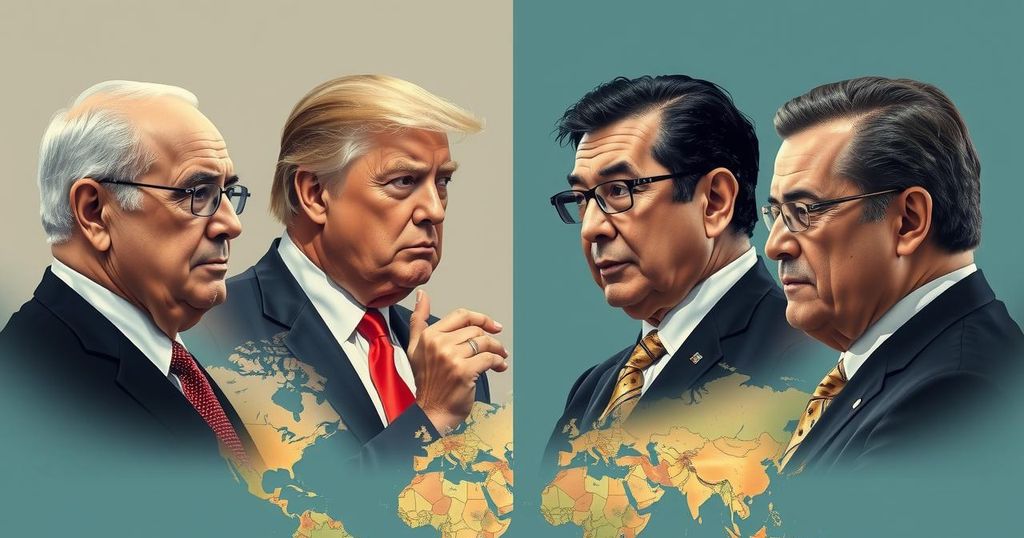
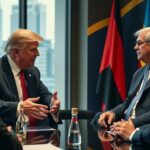
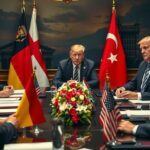
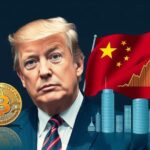
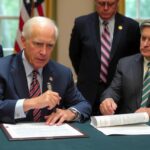



Post Comment